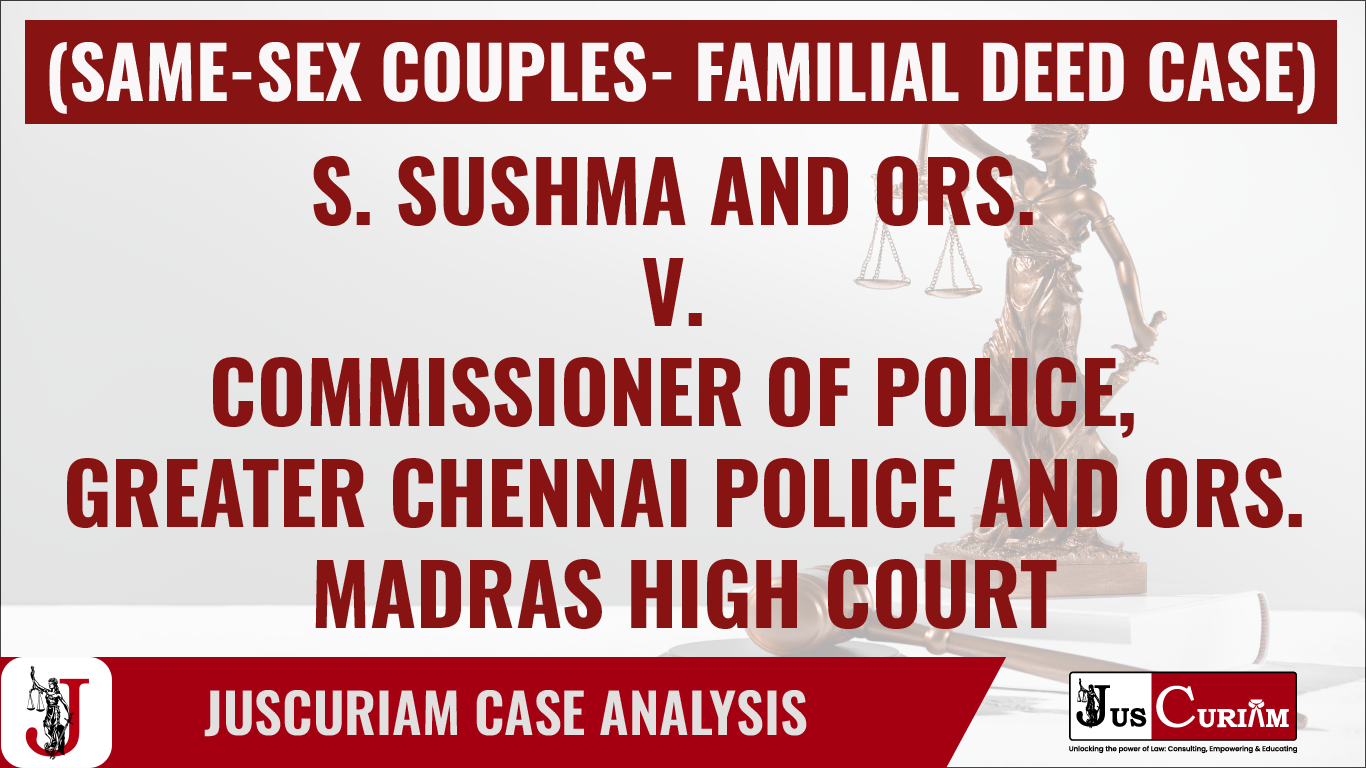citation:
W.P. NO. 7284 OF 2021
court:
MADRAS HIGH COURT
judges:
JUSTICE N. ANAND VENKATESH
IMPORTANT FACTS OF THE CASE:
In this particular case, the petitioners are a lesbian couple. Their parents were against the relationship. Fearing they would be parted from one another; the Petitioners ran away from their houses in Madurai and went to Chennai.
The petitioners’ parents reported their respective daughters missing to the police. The Petitioners were being questioned by the police at their home. The petitioners filed a writ suit at the Madras High Court to request that the police cease harassing them and to seek protection from their parents after they were subjected to such interrogations and perceived danger from their parents.
ISSUE AND DECISION:
Whether the police should be instructed to stop harassing the petitioners and to provide police protection was the main question on the court’s agenda. The petitioners’ attorney, however, urged the Court to give additional instructions for subsequent instances of a similar kind when this issue was decided.
The police’s government advocate accepted the petitioners’ main argument and promised to secure the petitioners’ safety as well as appropriate police training.
FUNDAMENTAL RIGHTS OF LGBTQIA+ GROUP:
The LGBTQIA+ group has the right to equality under Article 14, the Court said. The Court further stated that the ban against discrimination in Article 15(1) “on grounds only of religion, race, caste, sex, place of birth or any of them” was no longer limited to the specified characteristics following the rulings in NALSA v. Union of India and Naz Foundation v. Government of the NCT of Delhi. “Sexual orientation” and “gender identity” are also included in the list. The Court went on to state that the grounds are only tools for identifying and getting rid of discrimination; as such, they are only a means to an end.
The Court drew upon rights guaranteed by Article 21 of the Constitution in addition to case law from other common law jurisdictions. These included the freedoms of speech, association, privacy, and liberty, including the freedom against sexual discrimination.
The Court ruled that the LGBTQIA+ community could not be kept in a “vulnerable atmosphere” until the government passed legislation addressing the matter. Therefore, the Court needs to provide guidelines to fill the gap.
DIRECTIONS AND GUIDELINES:
The Court decided that once the police determine that a person is in a consenting relationship, they should close missing person cases.
It was requested of the Ministry of Social Justice and Empowerment to identify and promote non-governmental organisations (NGOs) that could assist members of the LGBTQIA+ community. It must also give accommodations to the community members in need of shelter in already-existing government short-stay houses.
In order to safeguard the rights of LGBTQIA+ individuals under the Constitution and the provisions of the Transgender Persons (Protection of Rights) Act, 2019 (the “Trans Act”), the Court ordered sensitization programmes.
The Court acknowledged that there were several parties for whom these programmes needed to be implemented, including the police, legal services agencies, lower courts, healthcare providers and workers, educational institutions, public and private businesses, and parents of LGBTQIA+ individuals.
Other important recommendations include:
1. Prohibiting attempts to “cure” sexual orientation or gender identity through medicine;
2. Revising curricula to teach students about the LGBTQIA+ community;
3. Extending benefits to LGBTQIA+ employees and hiring policies; and
4. Guaranteeing the LGBTQIA+ community access to free legal representation.
In order to periodically monitor and follow up with the pertinent departments, the Court granted the writ petition.
CONCLUSION:
The ruling upholds and puts into effect the freedoms of gender identity and sexual orientation guaranteed by the Constitution. It aims to oversee and enforce the execution of several significant policies that the community has advocated for, including the outlawing of conversion therapy and the development of LGBTQIA+ inclusive curricula and awareness campaigns. It further restates that the State has this obligation under the Trans Act.
In order to protect a partner’s freedom of choice, it also clearly lays out the process that the police must adhere to when missing persons complaints are made on behalf of individuals in consenting relationships.
Nevertheless, the ruling only applies to medical conversion therapy; alternative medicine and religious therapy are not included.
